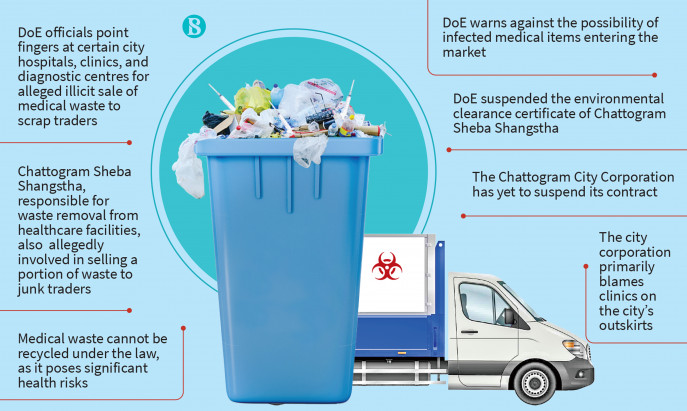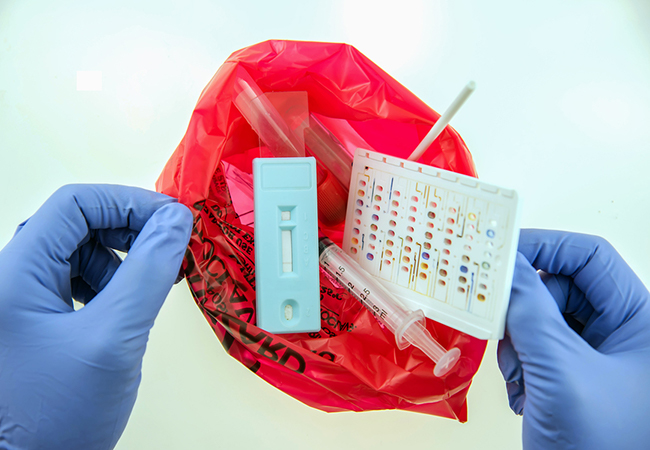Area Care: Smooth and Reliable Medical Waste Removal Near Me
Area Care: Smooth and Reliable Medical Waste Removal Near Me
Blog Article
The Value of Proper Medical Waste Disposal: An Overview for Health Care Facilities
Appropriate medical garbage disposal is a crucial facet of health care center administration, making sure the security and health of people, team, and the atmosphere. From understanding the different classifications of clinical waste to adhering to regulative requirements, health care centers need to embrace effective waste partition practices and select ideal disposal methods. Nonetheless, the importance of appropriate medical waste disposal surpasses mere compliance; it is a responsibility that needs recurring training and education and learning for team. In this overview, we will certainly check out the various facets of medical garbage disposal and highlight the crucial actions that medical care facilities ought to take. By applying these practices, health care facilities can alleviate risks, safeguard public health and wellness, and add to a cleaner, much safer atmosphere.
Recognizing Clinical Waste Categories
Understanding clinical waste classifications is vital for correct disposal in health care centers. Medical waste is a wide term that incorporates different sorts of waste created in health care settings, such as clinics, research laboratories, and healthcare facilities. Classifying clinical waste helps ensure that it is managed, saved, and disposed of safely and based on relevant regulations.
There are a number of classifications of medical waste that healthcare centers require to be familiar with. These categories include transmittable waste, sharps waste, pharmaceutical waste, chemical waste, and radioactive waste (medical waste disposal services with WasteX). Each category has particular characteristics and needs various disposal methods to lessen the danger of damage to health care employees, patients, and the atmosphere
Transmittable waste, for example, refers to lose infected with possibly contagious products, such as blood, body liquids, and cells. Pharmaceutical waste consists of ended or unused medications, while chemical waste consists of harmful chemicals used in medical procedures.
Compliance With Regulatory Requirements
Medical care centers should make certain compliance with regulative requirements for correct medical waste disposal. Governing bodies, such as the Epa (EPA) and the Occupational Security and Health And Wellness Management (OSHA), have actually developed guidelines and regulations to guard public health and wellness and the setting. These laws lay out the proper handling, storage, transport, and disposal of clinical waste.
Conformity with regulatory needs is crucial for medical care facilities to avoid lawful fines, reputational damages, and possible harm to human wellness and the environment. Failing to comply with these guidelines can lead to fines, lawsuits, and even the suspension or revocation of operating licenses.
To guarantee compliance, medical care facilities ought to establish extensive waste administration programs that include personnel training, proper waste segregation, and using suitable containers and labels. Routine audits and assessments ought to additionally be conducted to recognize any non-compliance problems and resolve them quickly.
It is necessary for medical care facilities to stay up to date with changes in laws and update their waste administration methods as necessary. This can be attained by proactively monitoring updates from regulatory bodies and taking part in training programs and workshops.
Carrying Out Reliable Waste Segregation Practices
To make certain proper medical waste disposal, medical care facilities should execute reliable waste segregation methods. Waste segregation is a critical step in the overall waste monitoring process, as it aids reduce the danger of infection, protects against cross-contamination, and makes sure the secure disposal of different kinds of waste. Efficient waste partition practices entail dividing medical waste right into different categories based upon its features and potential dangers.
One common technique is the segregation of sharps waste, such as needles and scalpels, from other sorts of medical waste. Sharps waste must be placed in puncture-resistant containers to avoid injuries and possible infections. Additionally, harmful waste, such as pharmaceuticals and chemicals, should be separated from basic medical waste to avoid ecological contamination.
Proper labeling and color-coding of waste containers are necessary for reliable waste partition. Clear and noticeable labels should be placed on each container to show the sort of waste it includes and any type of unique handling requirements - medical waste disposal services with WasteX. In addition, color-coding can be made use of to separate in between various waste categories, making it much easier for medical care team to get rid of and identify of waste appropriately
Routine training and education for health care staff is critical for the effective execution of waste partition techniques. Personnel must be educated on the different waste groups, proper segregation techniques, and the significance of following waste administration methods. This will certainly aid guarantee compliance and consistency in waste segregation practices throughout the center.
Picking Appropriate Disposal Techniques
Correct selection of appropriate disposal approaches is necessary in making certain the ecologically accountable and secure monitoring of medical waste in healthcare facilities. Health care facilities create a variety of clinical waste, including sharps, infectious waste, pharmaceutical waste, and chemical waste - medical waste removal services. Each kind of waste needs specific disposal methods to reduce the risk of contamination, injury, and ecological injury
One common disposal technique for medical waste is incineration. Incineration involves the regulated burning of waste at high temperatures.

Chemical disinfection is an additional technique made use of for sure kinds of clinical waste, such as pharmaceutical waste. This method makes use of chemicals to neutralize or ruin contaminants. It is important to choose chemicals that are risk-free and ecologically pleasant.
In some cases, land fill disposal might be appropriate for non-hazardous medical waste (medical waste disposal services with WasteX). Nevertheless, appropriate partition and packaging are crucial to stop leakage or contamination.
Inevitably, healthcare facilities should thoroughly assess the features of their medical waste and select proper disposal techniques that prioritize safety, ecological protection, and governing compliance. Normal training and monitoring are essential to guarantee that medical care team follows proper disposal procedures.

Training and Educating Team on Correct Disposal Procedures
Personnel education and training play a critical function in making sure the appropriate disposal of clinical medical waste disposal services with WasteX waste in healthcare facilities. It is important that all team member, including doctors, registered nurses, technicians, and assistance staff, receive detailed training on proper disposal procedures. This training must cover the various kinds of medical waste, their potential threats, and the proper methods for managing, segregating, and dealing with them.
Among the key goals of team education and learning and training is to make sure that all medical care professionals comprehend the value of appropriate disposal treatments and the possible effects of incorrect waste monitoring. They require to be conscious of the dangers related to medical waste, such as the transmission of infections and the contamination of the atmosphere. medical waste removal services. By understanding these risks, employee will certainly be extra motivated to comply with correct disposal protocols and take the necessary precautions to protect themselves, their coworkers, and the area
Training need to also cover making use of personal protective equipment (PPE) and the proper techniques for managing clinical waste. Employee ought to be educated on exactly how to determine and set apart different sorts of waste, such as sharps, helpful site transmittable waste, and harmful chemicals. They ought to likewise be trained on the proper usage of waste containers, such as sharps containers and biohazard bags, as well as the significance of labeling and securing these containers appropriately.
Additionally, personnel education and learning and training need to include routine updates and correspondence course to make sure that medical care experts stay educated regarding the most recent guidelines and ideal practices in clinical waste disposal. This continuous education is critical to keep a high level of understanding and compliance among personnel.
Final Thought
In verdict, appropriate clinical waste disposal is of utmost importance for healthcare centers. Understanding the various categories of medical waste and abiding with regulative needs guarantees the security and wellness of both medical care workers and the basic public.
From comprehending the various groups of medical waste to conforming with regulative demands, health care facilities should adopt reliable waste partition techniques and pick appropriate he has a good point disposal approaches. These categories consist of transmittable waste, sharps waste, pharmaceutical waste, chemical waste, and contaminated waste.To ensure appropriate clinical waste disposal, healthcare centers have to apply efficient waste partition practices. Waste segregation is an important step in the overall waste administration process, as it assists minimize the risk of infection, protects against cross-contamination, and makes sure the secure disposal of various types of waste. Health care facilities create a range of medical waste, consisting of sharps, infectious waste, pharmaceutical waste, and chemical waste.
Report this page